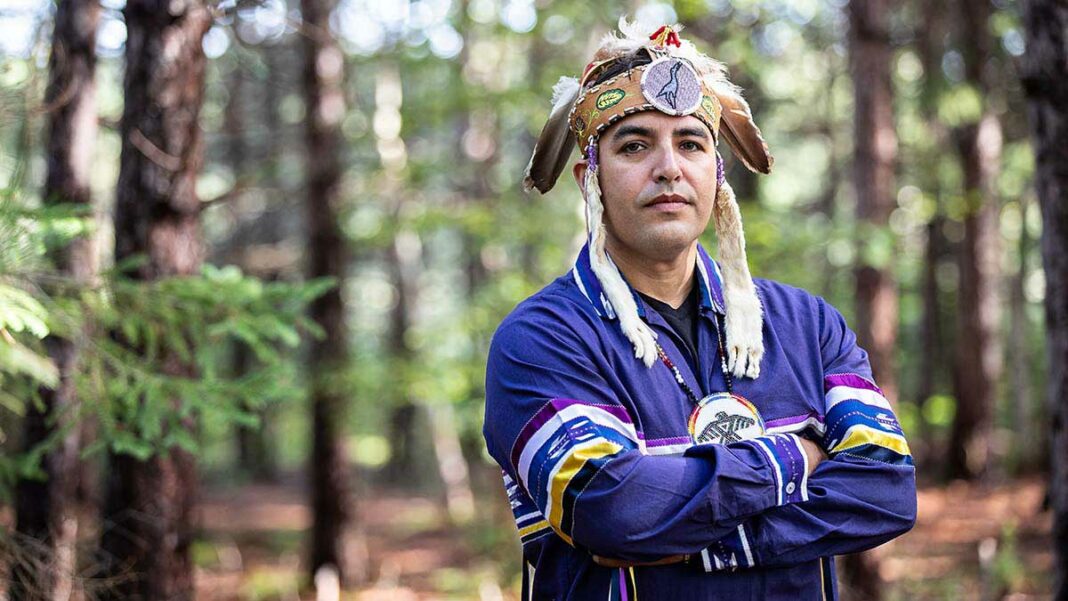Poses direct threats to the human rights of frontline Indigenous communities and the environment
OTTAWA—Representatives of 51 Tribal and First Nations located in the United States and Canada have submitted a report to the United Nations Human Rights Council (UNHRC) calling on the government of Canada to stop violating the human rights of Indigenous peoples through its support for Enbridge’s Line 5 crude oil pipeline. First constructed in 1953, Line 5 runs between Wisconsin and Ontario, traversing major waterways posing direct threats to Tribal Nations, communities and ecosystems along its path.
“The Anishinabek Nation supports the shutdown of Line 5,” Reg Niganobe, Grand Council Chief of the Anishinabek Nation said in a release. “Our communities have collectively stood in solidarity with our relations along the pipeline to protect the land and water against the potential for catastrophic environmental damage. For centuries, peoples of our nations have been caring for the Great Lakes; we are reliant on the waters for our way of life. We will be relieved when this line is effectively decommissioned, and we express gratitude to our relatives who have been leading this critical fight for years.”
Michelle Woodhouse, water program manager for Environmental Defence Canada said, “the ongoing operation of Enbridge’s leaky Line 5 in the Great Lakes basin is an ecological disaster in the making. It is also a clear violation of the inherent and treaty rights of the Anishinaabeg Nations of the Great Lakes.”
“The government of Canada must uphold Indigenous rights as required by law under an act respecting the United Nations Declaration on the Rights of Indigenous Peoples,” said Ms. Woodhouse. “This includes withdrawing its use of the 1977 pipeline treaty, working with US governments and the Anishinaabeg Nations of the Great Lakes to shut down Line 5, and implementing existing readily available alternatives to meet our energy needs.”
Whitney Gravelle, of the Bay Mills Indian Community said, “the rights of Indigenous people, of my people, are rights that should be respected by all sovereigns both domestic and abroad. Canada’s support of Line 5 is a disaster in the making for the entire Great Lakes region because an oil spill will poison our fish, harm our sacred sites, contaminate our drinking water, and ultimately destroy our Indigenous way of life.”
“The Straits of Mackinac are central to the Anishinaabe creation story, which makes this location sacred from both a cultural and historical perspective in the formation of the Anishinaabe people,” said Austin Lowes, the chairperson of the Sault Ste. Marie Tribe of Chippewa Indians. “Protecting the Straits is also a matter of the utmost environmental and economic importance, both to our people and the state of Michigan.”
The groups submitted the report for consideration under Canada’s upcoming Universal Periodic Review (UPR). As a UN member state, Canada’s human rights record is periodically scrutinized by UN member States through the UPR at the Human Rights Council. Canada will be reviewed during the 44th session of the UPR Working Group, which will take place November 6-17 this year.
“Line 5, which trespasses on traditional Anishinaabe territories in Wisconsin, Michigan, and Ontario, faces lawsuits from Tribal Nations and the State of Michigan,” the release continues. “Rather than respect and defend the rights of Indigenous peoples, Canada’s government has shielded Enbridge from being shut down, invoking the 1977 Transit Pipeline Treaty with the US and making legal submissions in US courts to keep the pipeline operating.”
The communities are urging the government of Canada to withdraw its invocation of the Pipeline Treaty and its positions in US litigation opposing decommissioning Line 5; ensure that affected Indigenous Nations, who are sovereigns and human rights holders, are invited to participate in discussions regarding the future of Line 5, including any negotiations under the Pipeline Treaty, so long as they continue. It calls on the government to interpret all international treaties, including the Pipeline Treaty, consistently with Canada’s human rights obligations; ensure affected Indigenous Peoples free, prior, informed consent (FPIC) before providing support for extractive sector projects and withdraw support from projects that do not have affected indigenous peoples’ FPIC. As well it calls on the government to, “ensure that corporations under Canadian jurisdiction do not cause or contribute to foreseeable threats to human rights.”





